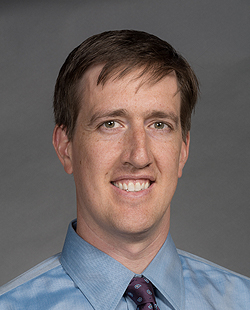Mark Duncan, MD is interested in working with fellows on addiction treatment in primary care settings. He attended medical school at Rush University where he developed an interest in co-occuring disorders. Dr. Duncan completed two separate residencies: one in family medicine at West Suburban Medical Center, and one in psychiatry at the University of Washington, where he was also a fellow in the UW Addiction Psychiatry Fellowship Program.
Hecurrently works in an outpatient psychiatry clinic with general psychiatry patients, consults in addiction psychiatry, is a consultant for both the Behavioral Health Integration Program (BHIP) and Mental Health Integration Program (MHIP),works on the Harm Reduction with Pharmacotherapy (HARP) study in alcohol abuse and homelessness, and works with family medicine residents to improve their training in mental health work. He loves his work because it is interesting, there is opportunity to help people and improve lives, and there are opportunities for innovation and creativity. Five years from now, he hopes that collaborative care has stretched to better treat addictions and opiate use to fill the need and potential within that field.
